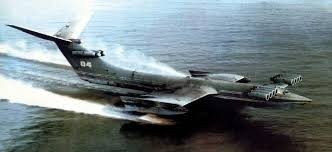The Ekranoplan
After the cold war ended the world was made aware of the "Caspian Sea Monster", so far the largest heavier-than-air vehicle ever to fly, that utilises the Ground-Effect principle. An aircraft designed a certain way when flying close to the ground can be made to float on a cushion of air and significantly reduce air resistance. This enables much reduced fuel consumption. This type of aircraft has become known by its Russian title "Ekranoplan". It could succeed where the hovercraft failed. Hovercraft use a lot of fuel and have never quite made it to major commercial success. Ground-Effect aircraft are extremely efficient and can therefore carry huge loads at a lower cost than other comparable modes of transport. A giant Ekranoplan could take holidaymakers from Britain to the Spanish coast in a few hours at a much reduced cost compared to a normal flight. But the biggest advantage is probably in freight. The bigger they get the more efficient they become. An Ekranoplan could be built to carry several times the payload of a standard aircraft and they could bridge the gap between ships and airfreight.
I once had a job interview at an import-export business in the steel industry and the owner of the business wanted to get more products delivered by sea rather than air to cut costs, but the time lag would have meant higher stock levels and more complex administration to go with it. A freight Ekranoplan would be ideal to bridge the gap. We could see more fresh produce traded around the world. The Falkland Islands could cope with an Argentinian blockade and still eat fresh produce by having it delivered regularly by an Ekranoplan from further away. They could be used to get emergency supplies to areas where it is needed much quicker than ships and in greater volume than aircraft, so long, of course, that the destination is coastal. The Russians built theirs as a military vehicle to move troops quickly and as a destroyer that could out-manoeuvre standard ships.
Information about the Ekranoplan is widely available but my interest in it comes from my job interview where I became aware of how useful it could be. And it also ties in with my belief that the UK political class needs to stop believing so obsessively in the free market and recognise the role of government in initiating economic and industrial revival. Perhaps the UK government could invest in a major military and civilian Ekranoplan programme, perhaps based in a former shipbuilding hub such as the north east of England. The military could commission some battle-Ekranoplans in the same vein as the Soviets and have a commercial spin off in the freight industry and in passenger Ekranoplans for medium-range overseas journeys.
It would seem like a gap in the market ready for exploiting. It would take 15-20 years before the first ones rolled off the production line and as a result only a government would have the patience and risk-aversion to initiate such a project. But it could lead to a major industrial cluster and export powerhouse that could endure for decades, creating many jobs, wealth and pride for a depressed economic area, and the country as a whole.

